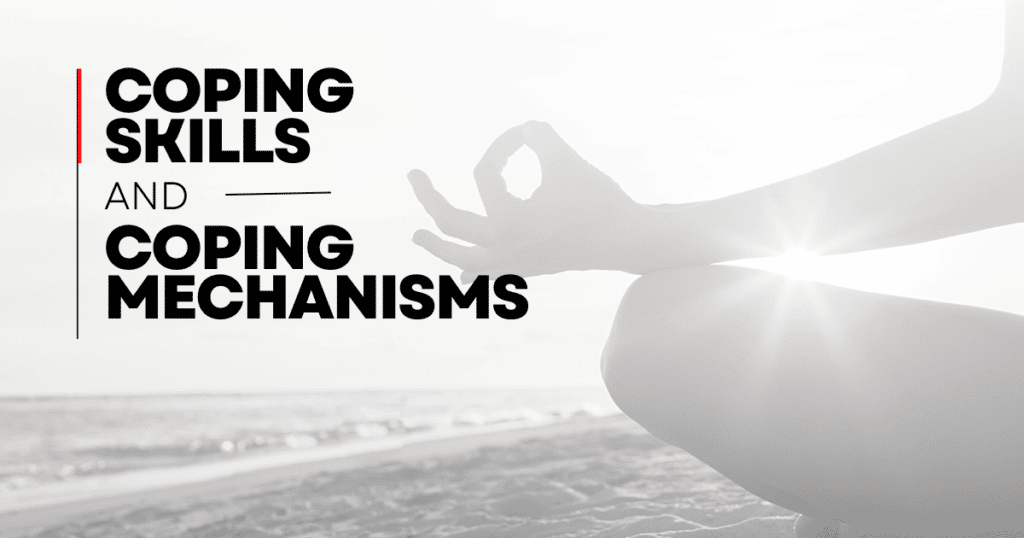Coping skills and coping mechanisms are integral to dealing with stress and difficult emotions that come into our lives. Coping skills are a way to show resilience and tolerate and deal with challenges throughout your life. You’ll feel better physically and mentally when you have healthy coping mechanisms.
Unfortunately, some people turn to negative coping skills when they experience stress, a mental health condition, or hard times. Negative coping mechanisms can diminish physical and mental health and worsen your emotional distress.
Why are Coping Skills Important?
We’ll inevitably face stress from time to time, as well as negative emotions and situations. When you know how to cope with these feelings, you can adjust and maintain a sense of emotional equilibrium and a positive self-image.
- Psychological stress is often associated with adverse life changes. For example, you might lose your job, or you could be dealing with the death of a loved one. There are times when seemingly positive changes can be stressful, such as the birth of a child or getting married.
- Changes create stress because they require that we adapt. When we experience too many changes in a short period, we start to feel like we aren’t in control of what’s happening.
- The perception can create low self-esteem and sometimes lead to depression or anxiety.
- Physical illnesses can worsen when someone’s ability to adapt to change is overwhelmed by too much of it occurring at once.
- If you can cope well, you can adjust to changing or unusual situations, demands, and stressors.
- You have to put more effort and energy into managing stressors in healthy ways than you typically need to put into your daily routines.
People experience both short- and long-term stressors. Short-term stressors are acute. Maybe you’re going through a divorce, for example. Longer-term stressors can include having a chronic illness or long-term financial issues.
All of these things highlight the importance of being able to cope. If you can’t cope well with anything happening in your life, it will diminish your quality of life and put you at risk of mental and physical health concerns.
What is Resilience?
When discussing coping mechanisms, it’s often a good time to discuss resilience. Resilience is a term used in psychology to describe the ability to adapt successfully to challenging experiences in your life. Resilience is especially defined through flexibility—mentally, emotionally, and behaviorally. Then, you can make needed adjustments to demands, internally and externally.
There are a lot of factors that contribute to or detract from our sense of resilience. Coping strategies are one of these factors, but so are the availability and quality of social resources and how we view and engage with the world. Research does show that skills and resources needed to develop greater resilience can be cultivated and practiced.
Healthy vs. Unhealthy Coping Mechanisms
Whether you realize it or not, you use coping mechanisms throughout your life. You might be using mechanisms that are healthy or unhealthy. Consider, for example, how you dealt with the stress of the COVID-19 pandemic. This is a good situation to highlight how well-developed your positive coping mechanisms are. Did you start online therapy, ensure you were staying socially connected even if it looked different, and did you practice self-care?
If you didn’t, you aren’t alone.
Unhealthy Coping Mechanisms
Many people turned to unhealthy coping mechanisms during the pandemic, including eating and drinking more, spending more time being sedentary and less active, and disconnecting from social support networks.
In general, unhealthy coping mechanisms can include:
- Avoidance: It can feel easier at the time to avoid problems, but when you try to run from problems or pretend like they don’t exist, they’re going to come to the surface again, inevitably. It’s just a matter of time.
- Too much sleep: Sleep can be a particular form of avoidance. Some people feel like when they’re dealing with stress, they want to hide from it and gain reprieve with sleep. Healthy sleeping habits are important to resilience and mental well-being, but too much sleep is problematic.
- Drugs and alcohol: Using drugs and alcohol as a coping mechanism can be risky. Self-medicating or using substances to deal with problems can lead to addiction, dependence, and health complications. Overdose and death are also possible.
- Spending money: If you find that you compulsively spend money when you’re experiencing stress, it could be a sign you’re using an unhealthy coping mechanism.
- Food: Whether you overeat or undereat when you have stress, you could use food as a coping mechanism.

Healthy Coping Mechanisms
The following are steps and particular things you can do to begin coping with stress healthier and develop a greater sense of resilience.
- Connect with people. Maintaining good relationships with friends and family and feeling like you can rely on them is essential for a healthy life. Simply talking to a friend when dealing with stress is an excellent coping mechanism.
- Look beyond the present. When you’re facing a challenge or a difficult situation, you can begin to see it as something impossible if you get too stuck in that moment. In reality, there will likely be a time when you are past it, so starting to think about your future circumstances can be better.
- Go to therapy. Working with a therapist or mental health professional is one of the most powerful coping mechanisms. When you go to therapy, you can share your negative thoughts and feelings and work on making real, actionable changes. Cognitive-behavioral therapy is an excellent option.
- Participate in support groups. If you’re in an especially difficult time, for example, dealing with grief from losing a loved one, join a support group. Support groups help you share what you’re experiencing and support others.
- Get active. Regular exercise and physical activity are coping mechanisms that can help you change your outlook. The role of exercise has a positive effect on your brain’s chemicals, and it can help you feel better nearly instantly. If you do a group exercise program, you’ll have the added benefit of social support as a result too. Aerobic exercise or weight training can be beneficial.
- Change your perspective. It isn’t easy, but changing your perspective is a healthy coping strategy. Develop confidence in yourself and your ability to tackle challenges head-on. Keep things in perspective, and remember to have an optimistic outlook even when it’s hard.
- Practice self-care. Self-care lets you think about your feelings and needs. Find things you find relaxing and enjoyable.
Mental Health Treatment for Teens in Southern California
Dealing with the stress of everyday life can be tough for anyone, but it can be especially challenging for teenagers. As they navigate the challenges of adolescence, teens often face pressure from school, friends, and family. This can lead to feelings of anxiety, depression, and loneliness. While coping mechanisms are helpful, it’s important they seek professional help if they are struggling with mental health issues.
If you’d like to learn more about cultivating resilience and building healthy coping strategies or a clinical approach to mental health-related issues for teens in Southern California, just call 855-746-8378 and the Hillside Horizon for Teens clinical team can help.





